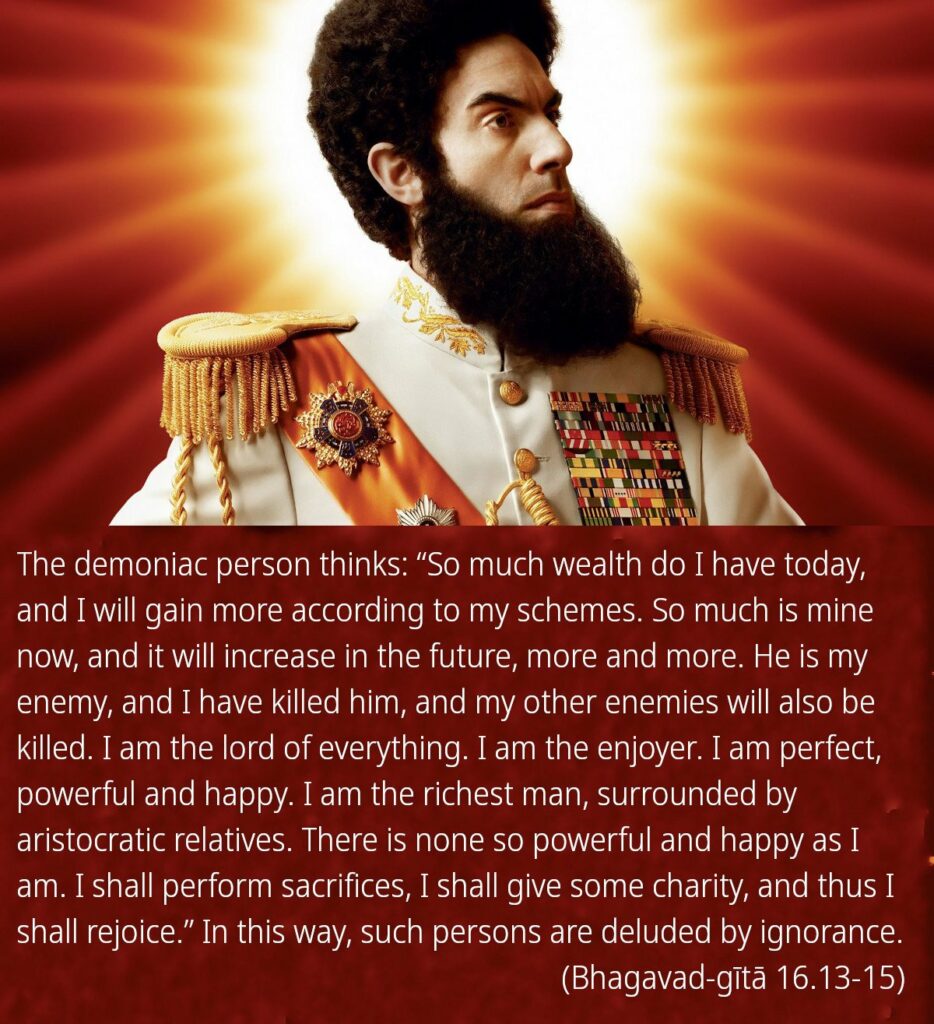इदमद्य मया लब्धमिमं प्राप्स्ये मनोरथम् |
इदमस्तीदमपि मे भविष्यति पुनर्धनम् || 13||
असौ मया हत: शत्रुर्हनिष्ये चापरानपि |
ईश्वरोऽहमहं भोगी सिद्धोऽहं बलवान्सुखी || 14||
आढ्योऽभिजनवानस्मि कोऽन्योऽस्ति सदृशो मया |
यक्ष्ये दास्यामि मोदिष्य इत्यज्ञानविमोहिता: || 15||
अनेकचित्तविभ्रान्ता मोहजालसमावृता: |
प्रसक्ता: कामभोगेषु पतन्ति नरकेऽशुचौ || 16||
idam adya mayā labdham imaṁ prāpsye manoratham
idam astīdam api me bhaviṣhyati punar dhanam
asau mayā hataḥ śhatrur haniṣhye chāparān api
īśhvaro ’ham ahaṁ bhogī siddho ’haṁ balavān sukhī
āḍhyo ’bhijanavān asmi ko ’nyo ’sti sadṛiśho mayā
yakṣhye dāsyāmi modiṣhya ity ajñāna-vimohitāḥ
aneka-chitta-vibhrāntā moha-jāla-samāvṛitāḥ
prasaktāḥ kāma-bhogeṣhu patanti narake ’śhuchau
idam—this; adya—today; mayā—by me; labdham—gained; imam—this; prāpsye—I shall acquire; manaḥ-ratham—desire; idam—this; asti—is; idam—this; api—also; me—mine; bhaviṣhyati—in future; punaḥ—again; dhanam—wealth; asau—that; mayā—by me; hataḥ—has been destroyed; śhatruḥ—enemy; haniṣhye—I shall destroy; cha—and; aparān—others; api—also; īśhvaraḥ—God; aham—I; aham—I; bhogī—the enjoyer; siddhaḥ—perfect; aham—I; bala-vān—powerful; sukhī—happy; āḍhyaḥ—wealthy; abhijana-vān—having highly placed relatives; asmi—me; kaḥ—who; anyaḥ—else; asti—is; sadṛiśhaḥ—like; mayā—to me; yakṣhye—I shall perform sacrifices; dāsyāmi—I shall give alms; modiṣhye—I shall rejoice; iti—thus; ajñāna—ignorance; vimohitāḥ—deluded; aneka—many; chitta—imaginings; vibhrāntāḥ—led astray; moha—delusion; jāla—mesh; samāvṛitāḥ—enveloped; prasaktāḥ—addicted; kāma-bhogeṣhu—gratification of sensuous pleasures; patanti—descend; narake—to hell; aśhuchau—murky
Translation:
“This I have gained today, and that longing I will fulfil. This wealth is mine, and that also shall be mine in future;
“That enemy I have slain, and others, too, I will slay. I am the lord of all; I enjoy; I am prosperous, mighty, and happy;
“I am rich; I am of high birth. Who else is equal to me? I will offer sacrifice, I will give, I will rejoice.” Thus, deluded by ignorance,
Bewildered by many fancies, entangled in the meshes of delusion, addicted to the gratification of lust, they fall into a loathsome hell.
Commentary:
The Lord gives a dramatic picture of the man of demonical nature. What he thinks is stated in direct speech, so that one can understand the spirit animating these unfortunate men who go down into foul hell. These words reveal the pride, greed, hatred, lust and delusion of these men of demonical nature.
Desires are never satisfied by enjoyment. With every luxury provided, more desires crop up for more refined luxuries. Wealth finds no end for the greedy men. He calculates what he has and hopes to get more and more in future. His mind is full of plans, plots and schemes to get more money by crooked means. He is proud of his power. He says ‘I have killed this enemy and other enemies also I shall destroy.’ So he is puffed up with the idea of his own invincibility. He thinks he is mighty and happy, born in a great family, the Lord of all, strong, powerful, unequal to any other. Who is there equal to me?’ is his challenge to the world.
What is the end for all this demonical pride, hatred and lust? The end is hell. Foul hell. Such men go down into the lowest worlds. They have no rest or peace, for, their minds are like the ocean tempest, lost by the winds of desires and bashed by lustful passions of sensual enjoyments. They appear to be great men, because they are wealthy and powerful, but if one has a glimpse into their self, he finds that they are like men stung by a hundred scorpions. If they do sacrifices and offer gifts, it is all done for self-glorification only. There is no truth in them. The bloated ego puffed up with pride, dominates them to such an extent that they declare themselves ‘I am Isvara’.
They are deluded by ignorance. The ‘rajasic’ nature over-powers them and ignorance (tamas) shrouds them in complete darkness, and they are unable to understand the true end of human life. They have no idea of the true nature of men and the world, and the Supreme behind all. They are deeply attached to earthly objects and live a life of restless ecstasy.
The true nature of the ‘sattvic’ man who is pure-hearted is never understood by them. Even if it is explained to them, they will not understand it. They consider the great teachers of the world as mad-caps, and their message as empty and foolish. What is their fate? The Lord emphatically declares that such men fall into foul Hell. That is the right royal road to Hell, the primrose path to eternal bonfire. Let the spiritual aspirants beware of it.
Question: What further are the qualities of people of demonical nature?
Answer: “This is gained, by me now, this desire I shall obtain, this wealth I have and this wealth also shall be to me hereafter, this enemy is destroyed by me and others also I shall kill, I am the Lord, I am the enjoyer, I am capable of achieving my ambitions, I am mighty and happy, I am rich, I am born in a great family, who is there another equal to me? I will perform sacrifice, I will give, I will rejoice” – in this way deluded by ignorance, bewildered by many fancies and notions, caught in the snare of delusion (of wife, sons, house and possession), deeply immersed in sensual enjoyment they fall into foul Hell. These are the qualities of the man of demonical nature.
Bhagavad Gita: Chapter 16 🔻 (24 Verses)

